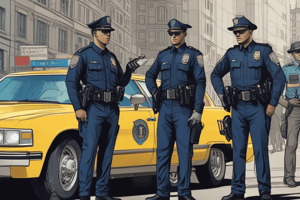Podcast
Questions and Answers
What is a key difference in police professionalism today compared to 50 years ago?
What is a key difference in police professionalism today compared to 50 years ago?
- Officers are trained to work independently from the community.
- The focus is primarily on reactive policing rather than proactive engagement.
- Police forces operate with less oversight from the government.
- There is a stronger emphasis on community policing and a 'duty of service'. (correct)
Why is diversity awareness training considered important for law enforcement in Canada?
Why is diversity awareness training considered important for law enforcement in Canada?
- To ensure that law enforcement reflects the increasing diversity of Canadian communities. (correct)
- To replace traditional policing methods with new strategies.
- To downplay cultural differences and promote a unified approach to policing.
- To promote the hiring of more officers from immigrant backgrounds.
What is the potential impact of a lack of police oversight?
What is the potential impact of a lack of police oversight?
- It encourages officers to take greater personal responsibility for their actions.
- It results in a more streamlined and efficient justice system.
- It allows police departments to innovate more freely.
- It may lead to a cycle of misconduct and erode public confidence in the police. (correct)
What is the meaning of 'explicit bias' in the context of police attitudes towards minority groups?
What is the meaning of 'explicit bias' in the context of police attitudes towards minority groups?
How can police culture potentially affect officers' adherence to codes of conduct?
How can police culture potentially affect officers' adherence to codes of conduct?
Why is it important for police departments to screen applications for certain background characteristics and qualities?
Why is it important for police departments to screen applications for certain background characteristics and qualities?
What is the significance of law enforcement reflecting the diversity of the community it serves?
What is the significance of law enforcement reflecting the diversity of the community it serves?
What is the likely consequence of greater social distance between the police and minority groups?
What is the likely consequence of greater social distance between the police and minority groups?
Which of the following is the LEAST effective measure for building trust in diverse communities?
Which of the following is the LEAST effective measure for building trust in diverse communities?
What is the primary goal of immediate reinforcement for recruits in community policing?
What is the primary goal of immediate reinforcement for recruits in community policing?
How do occupational attitudes gained over time impact an officer's behaviour?
How do occupational attitudes gained over time impact an officer's behaviour?
Given the increasing awareness of police misconduct, particularly against Black men, what is the most effective long-term strategy a police department can implement to foster better community relations?
Given the increasing awareness of police misconduct, particularly against Black men, what is the most effective long-term strategy a police department can implement to foster better community relations?
In a scenario where a police department aims to reduce 'social distance' with a minority community, which initiative would likely be MOST effective in fostering positive relationships?
In a scenario where a police department aims to reduce 'social distance' with a minority community, which initiative would likely be MOST effective in fostering positive relationships?
Considering the principles of transparency and accountability, which action would MOST effectively demonstrate a police department's commitment to addressing disparities and disproportionality in policing?
Considering the principles of transparency and accountability, which action would MOST effectively demonstrate a police department's commitment to addressing disparities and disproportionality in policing?
An officer fresh out of the academy faces the pressures of police culture. He is encouraged by his peers and superiors to make more arrests in the predominantly minority neighbourhood to meet the precinct’s quota, with complete disregard to the possible ramifications of racial profiling. Select the most ethical course of action.
An officer fresh out of the academy faces the pressures of police culture. He is encouraged by his peers and superiors to make more arrests in the predominantly minority neighbourhood to meet the precinct’s quota, with complete disregard to the possible ramifications of racial profiling. Select the most ethical course of action.
Flashcards
Policing Diverse Communities
Policing Diverse Communities
Law enforcement communicating and addressing the diverse needs of the community.
Diversity Awareness Training
Diversity Awareness Training
Training to recognize cultural differences and awareness.
Explicit Bias
Explicit Bias
Intentional, hostile stereotypes held by police officers.
Implicit Bias
Implicit Bias
Signup and view all the flashcards
Screening Applications
Screening Applications
Signup and view all the flashcards
Diversifying Police Personnel
Diversifying Police Personnel
Signup and view all the flashcards
Social Distance
Social Distance
Signup and view all the flashcards
Building Trust
Building Trust
Signup and view all the flashcards
Internal Oversight
Internal Oversight
Signup and view all the flashcards
External Oversight
External Oversight
Signup and view all the flashcards
Addressing Disparities
Addressing Disparities
Signup and view all the flashcards
Duty of Service
Duty of Service
Signup and view all the flashcards
Study Notes
- Policing Diverse Communities addresses Week 6 topics as of Feb 10.
- Trent University Durham is located on the treaty and traditional territory of the Mississauga Anishinaabeg.
The "Redefined" Police Professional
- Police professionalism has evolved significantly in the last 50 years.
- There used to be limited communication between police and the public.
- Community policing emphasizes collaboration to solve problems.
- Police are considered to have a duty of service to the community.
Policing Diverse Communities
- Law enforcement must communicate and address the diverse needs of the community.
- Canada is becoming increasingly diverse.
- Diversity awareness and community policing training are crucial.
- Community policing operates on the basis that officers are equipped to handle various communities.
Importance of Diversity Awareness
- Canada is a society of immigrants.
- Police officers cannot overlook diversity.
- Training should focus on officers recognizing cultural differences.
- Police training programs need to be developed in consultation with communities.
- Diversity training must integrated into "policing philosophy".
Police Misconduct
- There's increasing public awareness, particularly against Black men.
- Black individuals are more likely to experience "use of force" and be shot, even unarmed.
- Lack of police oversight contributes to an ongoing cycle of misconduct.
- Police misconduct diminishes public confidence in law enforcement.
Attitudes Toward Minority Groups: Background Characteristics
- Police attitudes are shaped by background characteristics.
- Police can possess explicit bias: intentional, hostile stereotypes, or implicit bias: non-intentional stereotyping.
- Background characteristics like upbringing, morals, values, and social location influence attitudes.
Attitudes Toward Minority Groups: Police Culture
- Attitudes are shaped by occupational experiences over time as a police officer.
- Police culture has the potential to hinder officers from adhering to codes of conduct.
- Pride in the job, strong work commitment, and empathy are what new recruits value the most.
- Behaviours and attitudes of new officers are strongly influenced by superiors.
Screening Applications
- Applications need to screened for background characteristics and qualities.
- Detailed background checks and psychological tests are necessary for police applicants.
- Screening ensures new officers are not a risk factor for misconduct.
Discussion Points
- Consider which qualities should disqualify someone from being a police officer.
- Deliberate which background characteristics determine a candidate's eligibility.
- Focus on the personality traits and qualities relevant to policing.
Diversify Personnel of Officers
- Needs to diversify police workplace and officers.
- Law enforcement should mirror the diversity of the community.
- Priority is given to recruiting individuals from minority groups in many police organizations.
- Research suggests distinct insights between officers from diverse backgrounds and those who are not.
Social Distance
- Social distance or perceived distance between police and the community leads to negative perceptions of police practices.
- Increased social distance makes police more likely to view minority groups as dangerous.
Transparency and Accountability
- Building trust in diverse communities involves acknowledging historical context and cultural competency.
- Accountability should be tailored to diverse needs, with internal oversight and external oversight reflecting community diversity.
- Addressing disparities and disproportionality requires data transparency and reforming practices that contribute to disproportionality.
Training for Community Policing
- There are existing failures in training all officers in community policing.
- Immediate reinforcement is required for recruits to confirm community policing's value.
- Officers need training to handle negative interactions and effectively communicate.
Next Steps
- Reading Week is next, followed by Week 7, Feb 24.
- Reading for Feb 24: Russell, Chapter 5 (first half), pages 150-160.
Studying That Suits You
Use AI to generate personalized quizzes and flashcards to suit your learning preferences.



